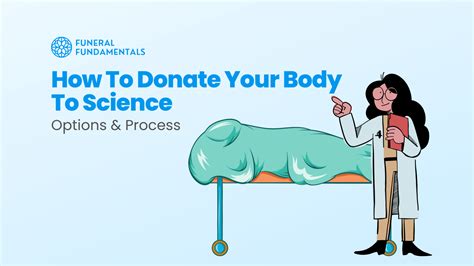How To Donate Your Body To Science: A Comprehensive Guide
Donating your body to science is a selfless act that can significantly advance medical research, education, and the understanding of the human body. It's a powerful way to contribute to future generations even after your passing. This guide will walk you through the process, addressing common questions and concerns.
Understanding Body Donation
Before diving into the specifics, it's crucial to understand what body donation entails. When you donate your body, you're gifting it to a medical school, university, or research institution for anatomical study, research, and training purposes. This might include dissection, study of tissues and organs, and the development of new surgical techniques.
What happens to my body? Your body will be used for educational and research purposes. The specific procedures will vary depending on the institution and their current needs. After the body is no longer needed, your remains will typically be cremated, and the ashes will be returned to your family according to your wishes (or as per the institution's policy).
What are the benefits of body donation? Beyond the personal satisfaction of making a significant contribution, you can potentially save lives and improve medical practices. Your donation directly helps train future doctors, nurses, and other healthcare professionals, leading to better patient care in the future.
Finding a Body Donation Program
The process of donating your body begins with finding a reputable program. This is crucial as standards and procedures can vary.
Where to search:
- Medical schools: Start your search by contacting the anatomy departments of medical schools in your area.
- Universities with medical programs: Many universities with robust medical programs also accept body donations.
- Research institutions: Certain research institutions may also accept donations for specific research projects.
- Online search: You can use search engines, adding terms like "body donation program [your state/region]" to narrow your results. However, always verify the legitimacy of any program you find online.
Important considerations when choosing a program:
- Reputation: Research the institution's reputation and ensure it's accredited.
- Fees: Some programs may cover costs associated with transportation and cremation; others might require some financial contribution from your family. Clarify this upfront.
- Specifics of use: Understand how your body might be used and inquire about the program's policies regarding storage, handling, and final disposition of your remains.
The Donation Process: Step-by-Step
Once you’ve identified a suitable program, the donation process generally involves these steps:
- Contacting the Program: Reach out to the program coordinator to express your interest and request information.
- Registration: You’ll typically need to complete a registration form, providing details about your medical history, any pre-existing conditions, and your wishes regarding the disposition of your remains.
- Review and Acceptance: The program will review your application. There may be certain medical conditions or circumstances that could exclude you from the program.
- Legal Documentation: You'll likely need to sign legal documents, such as a consent form. It is recommended to discuss this with your family and ensure they understand your wishes.
- Notification: After your passing, your family will need to notify the donation program as soon as possible. The program will then arrange for the transportation of your body.
What Your Family Needs To Know
Open communication with your family is essential. Discuss your decision with them, explaining your reasons and ensuring they understand the process. Providing them with the contact information for the donation program will ease their burden during a difficult time. Strong communication can prevent confusion and ensure your wishes are respected.
Frequently Asked Questions (FAQs)
Q: Will my body be used for anything unethical or against my religious beliefs?
A: Reputable programs adhere to strict ethical guidelines. You can discuss your concerns and beliefs with the program coordinator to ensure they align with your values.
Q: What if I change my mind?
A: You are generally free to withdraw your donation at any time. Just contact the program and inform them of your decision.
Q: Are there any costs associated with body donation?
A: Costs vary. Some programs cover all expenses, while others may have fees associated with transportation or cremation.
Q: What happens if my body is unsuitable for donation after I die?
A: Most programs have procedures in place for such instances, often returning the body to your family.
Donating your body to science is a deeply personal and meaningful decision. By carefully considering the information provided and following these steps, you can ensure a smooth and respectful process. Remember, your contribution will make a lasting impact on the advancement of medical knowledge.
